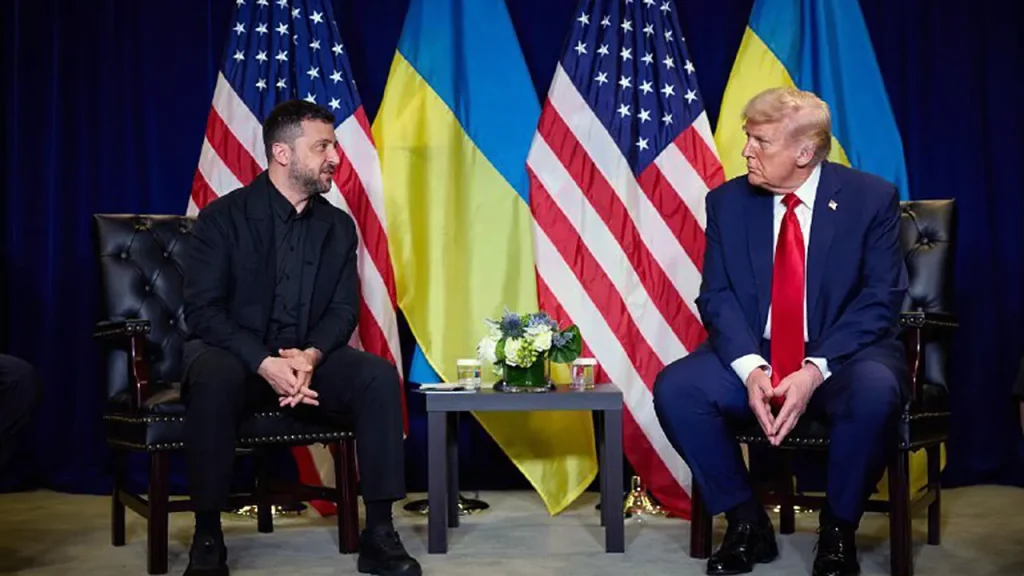Trump’s Surprising Shift on Ukraine: A Sign of Hope or Empty Words?
In a remarkable turn of events, President Donald Trump has dramatically reversed his position on the Ukraine-Russia conflict, suggesting that Ukraine could reclaim all territory seized by Russia with proper support. “I think Ukraine, with the support of the European Union, is in a position to fight and win all of Ukraine back in its original form,” Trump declared on social media. This statement represents a stark departure from his February Oval Office meeting with Ukrainian President Volodymyr Zelenskyy, where he bluntly told the Ukrainian leader he “didn’t have the cards” to take on Russia and would need to make significant concessions to end the war. The surprising pivot has sent ripples through the international community, with former Zelenskyy defense advisor Yuriy Sak expressing hope that “this change of his approach will hopefully translate into more unity in terms of the Western alliance and their support for Ukraine.”
Security experts have offered mixed reactions to Trump’s new stance. While some view it as a positive development, others remain skeptical about its practical impact. Former CIA Moscow station chief Dan Hoffman argued that words alone won’t influence Russian President Vladimir Putin: “For all the years I spent trying to see the world through the twisted KGB eyes of Vladimir Putin…he does not care about words. He thinks he can use them against us.” Hoffman pointed to Russia’s recent military provocations, including airspace violations involving drones and fighter jets over NATO nations, as evidence that Putin is actively testing Western resolve. “He’s trying to show that the United States doesn’t have the throw-weight to deter Russia from threatening NATO members in Eastern Europe,” Hoffman explained, suggesting Putin’s message to Ukraine is essentially: “You don’t want to rely on the United States, stop fighting, we’re going to beat you anyways.”
The Kremlin quickly dismissed Trump’s assessment, with spokesperson Dmitry Peskov telling reporters that Trump was “mistaken” about the war’s progress, claiming that “the dynamics on the front lines speak for themselves.” However, this assertion contradicts reality on the ground—Russia has made few significant advances since early 2024, with front lines remaining largely static for the past 18 months. Security experts like Hoffman argue that meaningful support for Ukraine would require concrete actions: lifting all strike restrictions, immediately enforcing secondary sanctions without waiting for European coordination, pressuring NATO allies like Germany to provide long-range strike missiles, and convincing Denmark to close the Danish Strait to Russia’s shadow fleet. Without such decisive measures, Putin is unlikely to reconsider his war operations.
Lithuanian Defense Minister Dovilė Šakalienė found Trump’s position reversal “very encouraging,” stating, “I completely agree with the statement that, definitely, Ukraine has a right and a chance, with our full support, to go back to regain its original borders.” She emphasized that fear and inability to defend international rules are the only real obstacles to Ukraine’s success. Šakalienė highlighted the significance of recent Russian provocations against NATO members: “The recent series of incidents, both drone related in Lithuania, Estonia, Latvia, Poland, and also related to the incursion into our air space by Russian fighter jets, demonstrate again and again that Russia is coloring outside the lines.” She warned that such actions would continue and escalate because Russia feels “unpunishable” and “untouchable,” thereby directly challenging NATO’s credibility and resolve.
All experts consulted agree that America’s role in countering Putin remains “critical,” with Šakalienė noting that “the current world security architecture is built around the axis of the United States.” While Europe should strengthen its own military capabilities, she emphasized that “the United States’ voice is the one that Russia hears the loudest.” Trump even suggested Ukraine should “maybe even go further” than just reclaiming occupied territories—a proposition that Ukrainian advisor Sak quickly tempered, clarifying that Ukraine has “never had the ambition to conquer Russian territory. We don’t need it. We just want them out of our land.” Sak acknowledged the limitations of purely military solutions at this stage, suggesting that Ukraine’s goals would require “a mixture of diplomatic means, and it probably will take a long time.”
For Ukraine, Trump’s comments represent not a promise of immediate American action but rather a “confirmation” that the president is now fully committed to supporting Ukraine alongside NATO allies. “Standing shoulder to shoulder with the European partners of Ukraine…this alone represents a big threat to Russia,” Sak explained. “They know it, and this, once again, sends them a message that this is an unwinnable war for them.” The Ukrainian perspective emphasizes a comprehensive approach combining sanctions with military pressure: “Sooner or later, when we cripple their economy in a combination of sanctions plus the deep strike drones that we carry out on a daily basis, Russia will be in a position that, despite their willingness to fight this war and continue to cause these crimes of aggression, it will not just be able to do so purely for economic reasons.” As the conflict continues, the world watches to see whether Trump’s rhetorical shift will translate into meaningful support for Ukraine’s sovereignty and territorial integrity.


